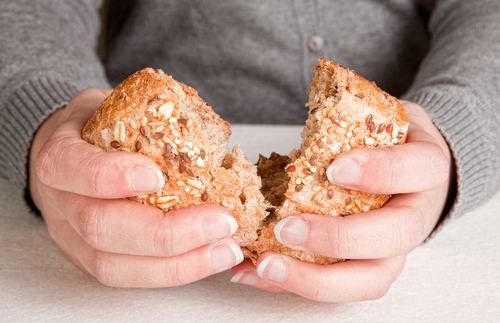Issue #2 – gluten’s effect on the brain. Gluten is the only grain protein which, when digested into polypeptide chains, crosses the blood brain barrier. This is true for both the new “dwarf” wheats as well as the heritage wheats. And what does it do in the brain? Among other things, these gluteomorphins lodge in the endorphin receptor sites, causing . . . you guessed it! Euphoria. Mild euphoria for some, greater for others, but euphoria nonetheless. And so gluten in wheat is addictive. It can be subtle; all people know is that they crave certain foods – if you pay attention, many of the foods that are craved contain wheat and gluten. This craving side effect of eating wheat in people with normal brain activity leads to weight gain and the development of diabetes.
This is bad enough, but in people with different brain activity such as ADHD symptoms or autism symptoms, or even schizophrenia, the gluten in wheat can cause great exacerbation of symptoms. So psych wards which have removed wheat have seen tremendous calming of hallucinations and delusions only to have them get worse again when wheat is added back into the cafeteria food, for example. And children with autism show much more stimming activity when wheat is consumed.
Issue #3 – gluten’s effect on the intestinal tract. Consumption of gluten leads to higher production by the body of a protein called zonulin, which loosens the tight junctures in the intestinal lining. A tightly woven intestinal lining is what keeps undigested food from going into the abdominal cavity and ending up in the bloodstream, where they elicit immune responses. Essentially, eating gluten results in a leaky gut, especially in those who already have impaired digestion, and this can lead to autoimmune disorders as described at the beginning of the article. Although people tend to associate Celiac Disease and gluten sensitivity with digestive symptoms, rarely do people realize that zonulin is doing its dirty deed in their intestinal tract even if they are not sensitive to gluten.
Another thing that people don’t usually realize is that most of the devastation caused by ingestion of wheat is not digestive, and because most people think wheat issues mean digestive problems, many people affected by wheat are currently experiencing symptoms that are “mysterious” – unrecognized and untreated. There is a huge educational campaign currently under way in the medical community, both holistic and conventional, to correct this misunderstanding.
Issue #4 – gluten’s effect on weight gain and the development of diabetes. The type of starch in wheat, amylopectin A, is different from the starch in things like potatoes, beans, and other grains, and one of its characteristics is that it is very easily digested. Although this sounds like a good thing, in fact it is not, because what it means is that the starch in wheat is immediately converted to glucose and raises blood sugar quickly. When blood sugar is raised quickly in the body, the body sees it as dangerous and immediately over-secretes insulin to get the glucose level down. But why does it over-secrete insulin, you ask. Well, the pancreas’ job was never to balance your blood sugar – it was to store energy in fat tissue for lean times. But we make the pancreas balance our blood sugar – it obliges, but unfortunately it does so in a very primitive way. It tends to overreact and secrete so much insulin that our blood sugar then falls quickly, which is a different kind of emergency for the body.
At this point the adrenal glands get involved and shoot out adrenaline and direct the body to take glucose back out of storage and dump it into the blood stream again, and here we are on the blood sugar roller coaster. When we do this for enough years, the pancreas, liver, and adrenal glands take a big hit, and we develop either severe hypoglycemia or insulin resistance, or diabetes, or all of the above in succession. What happens to us depends on which of our organs is weakest genetically, which has been hit hardest by our habits, and whether we change our habits.
The lesson to draw from all of this is that wheat and gluten are dangerous for everyone, not just for people with wheat sensitivity, and this is true whether you are eating new wheats or heritage wheats, although more so for new wheats. The good news, though, is that it is easy to live without gluten, and it exposes people to new foods. Not to sound cliché, but every problem is an opportunity!
– Babette
To learn more about Babette, click here






